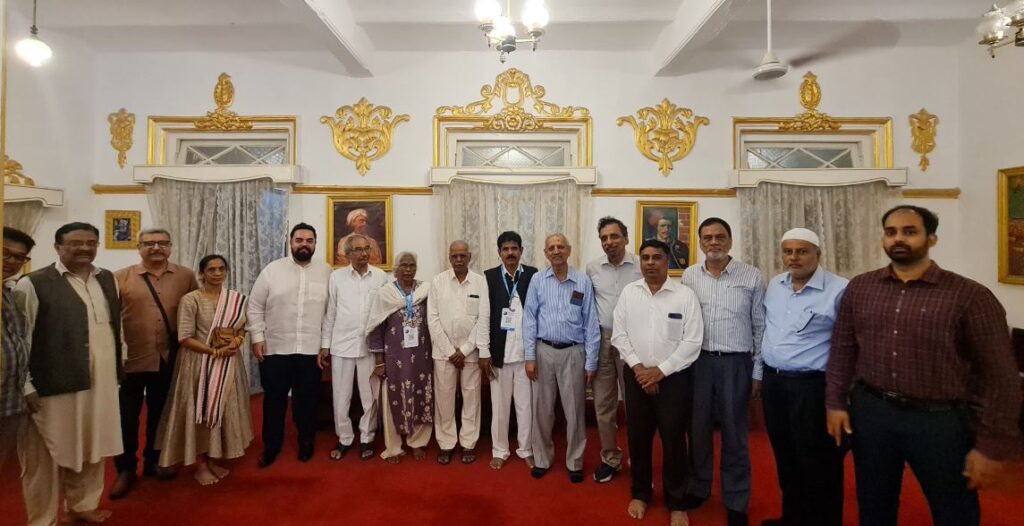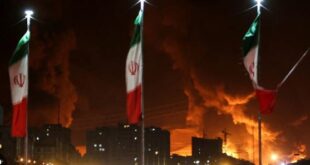Hyderabad, October 4: If India and Pakistan were to engage in a nuclear war, the human toll could be catastrophic, potentially leading to the deaths of nearly 2 billion people, according to the Indian Doctors for Peace and Development (IDPD). This stark hypothetical scenario was discussed during a recent meeting organized by Syed Ahmed Amiruddin, head of the Rahnuma-e-Deccan family, where Dr. Arun Mitra, President of IDPD, highlighted the global and regional devastation that would follow such an exchange.
“Even in hypothetical terms, the consequences of a nuclear conflict between India and Pakistan would be unimaginable,” said Dr. Mitra, whose organization is affiliated with the International Physicians for the Prevention of Nuclear War (IPPNW). “The use of nuclear weapons would trigger widespread chaos, destruction, and a humanitarian crisis of unprecedented scale.”
In a nuclear conflict between the two neighboring countries, both of which possess significant nuclear arsenals, densely populated areas could be devastated within minutes. Cities across India and Pakistan would face annihilation, with millions killed instantly in the initial blasts. The fallout from such a conflict, however, would extend far beyond the borders of the two nations.
Dr. Mitra warned that the immediate casualties from the blasts could be compounded by long-term effects such as radiation exposure, widespread disease, and environmental degradation. “Doctors would have no remedy to treat the victims of nuclear war. The medical community would be overwhelmed, and there would be no way to address the vast suffering of the survivors,” he explained. Food and water supplies would be contaminated, and global climate disruption could cause widespread famine, further compounding the disaster.
Additionally, nuclear winter—where soot and ash from the explosions would block sunlight—could lead to a sharp drop in global temperatures, crippling agricultural production worldwide. This could result in massive food shortages, not only in the region but across the globe, affecting billions of people.

The environmental damage, Dr. Mitra pointed out, would be irreversible. Forests and ecosystems would be destroyed, and the atmosphere would be contaminated with radiation, leading to long-term health risks such as cancer and genetic mutations in the survivors. “The ripple effects of a nuclear war between India and Pakistan would be felt by the entire world, not just the two countries involved,” Dr. Mitra said.
Such a scenario, while hypothetical, remains a looming threat due to the geopolitical tensions between the two nations. Both India and Pakistan have fought several wars since their partition in 1947 and remain at odds, particularly over the Kashmir region. While diplomatic efforts have periodically reduced tensions, the risk of escalation remains ever-present.
Beyond the hypothetical India-Pakistan conflict, Dr. Mitra also discussed the risks posed by nuclear weapons globally. “If a nuclear exchange were to occur between the United States and Russia, it would wipe out 6 billion people,” he noted, illustrating the even broader threat posed by the existence of nuclear weapons worldwide.
The IDPD, founded in 1984 as the National Association of Indian Doctors for Prevention of Nuclear War (NAIDPNW), has been a vocal advocate for nuclear disarmament and global peace. It is affiliated with IPPNW, which was awarded the Nobel Peace Prize in 1985 for its efforts to raise awareness of the dangers of nuclear weapons.
As tensions continue to simmer in various parts of the world, including the ongoing conflict between Russia and Ukraine, the risks of nuclear escalation are not confined to South Asia. Dr. Mitra also highlighted the dangers posed by attacks on nuclear power plants, warning that even localized conflict could result in widespread radiation exposure if such facilities are compromised.
In light of these risks, the IDPD is organizing an international seminar in Delhi in December 2024 to discuss nuclear disarmament, humanitarian crises, and the ongoing violence in Palestine. An international conference is also planned for October 2025 in Nagasaki, Japan, focusing on the global threat of nuclear weapons and the urgent need for peace.
Among those in attendance at the Hyderabad meeting were Syed Ahmed Amiruddin, Dr. Arif Ahmed, noted allergist and pediatrician, Syed Khaled Shahbaaz, CEO of Media Plus, Dr. D. Ramkishan, Principal of Government Medical College, Narayanpet, Dr. P. Pratap Reddy, Dr. K. Rapani and other prominent medical professionals and social leaders.
While the idea of a nuclear war between India and Pakistan remains hypothetical, the warning is clear: the human and environmental cost would be beyond comprehension, and the pursuit of peace is the only solution.
 Gawah (The Witness) – Hyderabad India Fearless By Birth, Pristine by Choice – First National Urdu Weekly From South India – Latest News, Breaking News, Special Stories, Interviews, Islamic, World, India, National News
Gawah (The Witness) – Hyderabad India Fearless By Birth, Pristine by Choice – First National Urdu Weekly From South India – Latest News, Breaking News, Special Stories, Interviews, Islamic, World, India, National News





